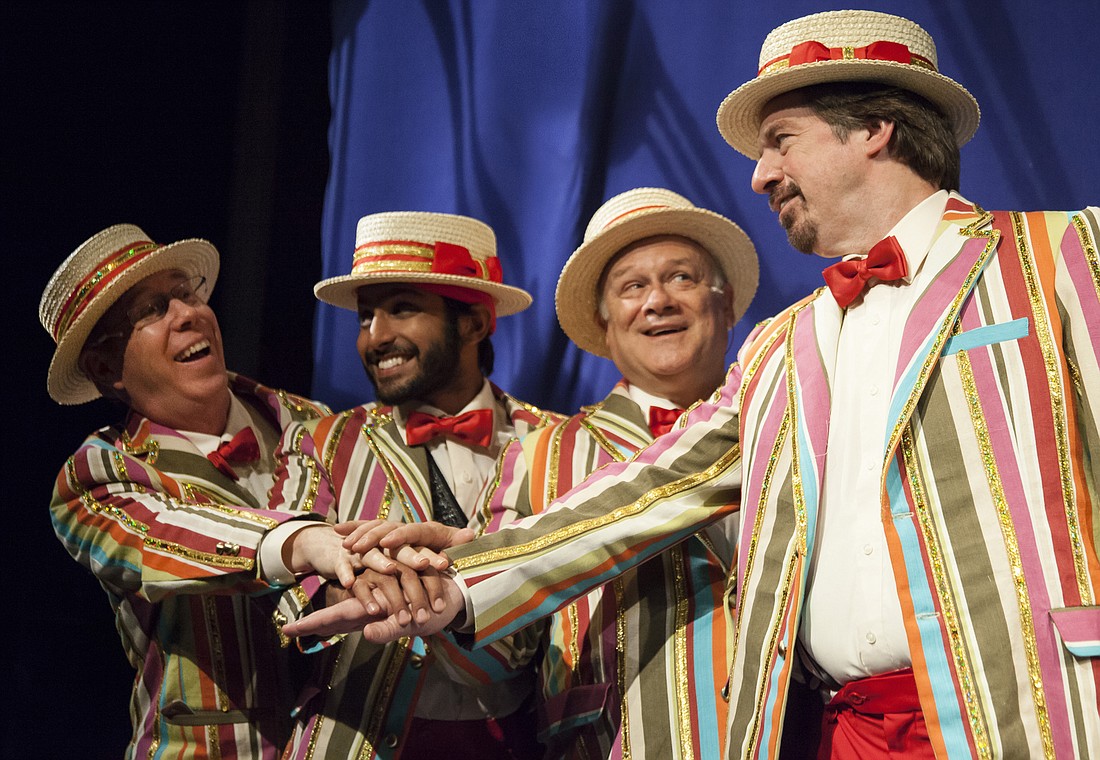- April 26, 2024
-
-
Loading

Loading

Mark St. Germain and John Markus’ “The Fabulous Lipitones” is now on stage at Florida Studio Theatre. It’s a celebration of barbershop’s all-American harmonies. What does “all-American” mean, exactly? Stick around, and you’ll find out.
Not to hand you any spoilers, but the story’s about a coffin and a contest. A death sets it all in motion: Andy, the glue behind a Midwestern barbershop quartet called the Fabulous Lipitones, has shuffled off this mortal coil and joined the choir invisible. Now the three surviving singers have an Andy-shaped gap to fill. The victory they seek? They want to crush their rivals (the smug “Sons of Pitches”) at the upcoming barbershop quartet finals. But who can take Andy’s place? Bob, that’s who. The Lipitones call him into their basement lair after his stellar phone audition. In the flesh, “Bob” turns out to be an illegal immigrant—a Sikh from the subcontinent who detects animal cruelty in “Bill Grogan’s Goat” and Oedipal implications in “I Want A Girl (Just Like The Girl That Married Dear Old Dad).” The man’s a hit with two of the singers; Bob’s got Bollywood moves and he sure can sing. Phil, the group’s leader, surely can’t stand him—but he grudgingly bows to the majority and lets Bob join.
John Markus, the director and co-playwright, hands you this improbable set-up and says “Hey, it could happen.” Some comedy works best with a straight face—high-concept comedy, especially. Markus never over-sells it, and keeps the sit-com situation plausible. Musical director Steven Freeman believably weaves the old tunes in and out of the characters’ situation. Isabel and Moriah Curley-Clay add to the authenticity with the charmingly seedy basement bar where the Lipitones practice.
The actors all nicely get into the skins of their characters and make you believe in them. Even when they’re occasionally non-believable …
Levin Valayil is a show-stopper as Bob. His Sikh character is a decent guy with a lot of talent who’s slow to anger when dealing with snubs and implied racism. D.C. Anderson is exceedingly funny as Howard—the milquetoast husband catering to his ailing wife while trying to make peace with his squabbling friends. Joel Blum is a hoot in his own right as Wally, a sexually frustrated pharmacist. Scott Wakefield hits it out of the park as Phil, the hometown racist who balks at a brown-skinned crooner. Great performance—of a character who doesn’t always work on the page. Blame that sour note on the playwrights. (Spoiler alert.)
Phil is basically a thin Archie Bunker who can sing. He talks about Al-Qaeda and Homeland Security at the top of his voice—then rats Bob out to the Department of Immigration. It’s as subtle as an elbow to the ribs. Far better if Phil had smiled in Bob’s face, muttered his insults behind his back—and then made the call. What we get, instead, is broad comedy. (It got laughs, to be fair.)
There’s an honest observation at the play’s heart: America’s all-white institutions are changing complexion. It’s possible to honor their history while accepting change. And move on. The play never hits you over the head with this notion. But that’s the essence.
Mostly, this hardly serious play cracks jokes at the expense of four, quirky, broadly drawn characters. It also celebrates the Barber Shop medium itself—tongue firmly planted in cheek. The play mocks the style, while simultaneously savoring the nostalgic, chocolate sundae sweetness of it all. The audience gets to have it both ways.
“The Fabulous Lipitones” makes barbershop quartets cool again by … on second thought, no. Barbershop quartets never were cool and they never will be. This art form is as corny as a Norman Rockwell illustration and as all-American as James Montgomery Flagg’s Uncle Sam poster. Markus and St. Germain’s play gives you some laughs and warm moments—and gets right to the heart of what happens to an all-American style in an America of constant change.